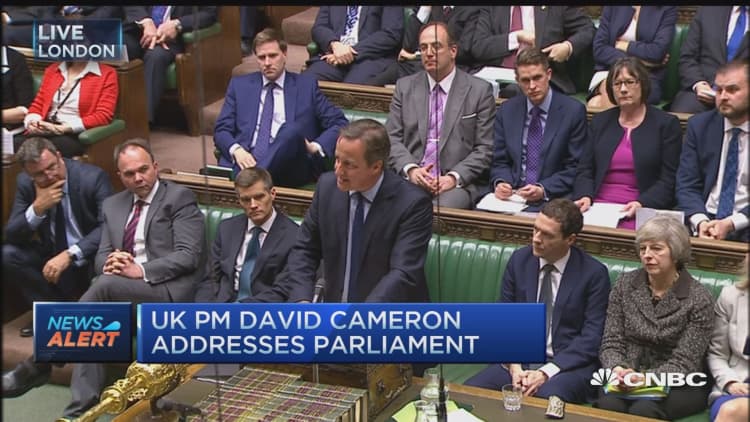


British Prime Minister David Cameron lashed out Monday at what he called "deeply hurtful and profoundly untrue" claims about his late father's financial arrangements.
Cameron has been under mounting pressure since his father, Ian Cameron, was identified as a client of a Panamanian law firm that specializes in helping the wealthy reduce their tax burdens. Cameron initially refused to say whether he had a stake in an offshore firm established by his father, before acknowledging he had sold his shares in it shortly before he became prime minister in 2010.
Speaking in the House of Commons, Cameron said his father set up an offshore trust for investment purposes and not to avoid tax. He said the firm, Blairmore Holdings, was based overseas so it could trade in dollar securities.
"This is an entirely standard practice and it is not to avoid tax," Cameron said. He said millions of Britons had investments in such funds through their pensions.
"There have been some deeply hurtful and profoundly untrue allegations made against my father," who died in 2010, Cameron said.
Cameron's statement in the House of Commons, after days of damaging headlines marked an attempt to restore his government's shaken reputation.
Revelations about the Cameron family finances — found among more than 11 million documents from the law firm Mossack Fonseca — have overshadowed the government's claim that it is committed to closing tax loopholes.
The prime minister, a former PR man with a reputation for sharp political intuition, appeared to be caught off-guard by the issue. His office initially insisted that his financial arrangements were private, before acknowledging that Cameron and his wife had sold some 30,000 pounds ($44,000) in shares in the offshore fund shortly before he became prime minister in 2010.
Finally, on Sunday Cameron published a summary of his tax returns since 2009, becoming the first British leader to do so. The records appear to show that Cameron paid his full share of tax — 75,898 pounds on taxable income of 200,307 pounds in the most recent tax year.
But the document also generated a new round of headlines over a 200,000 pound gift from his mother on which Cameron — legally — paid no tax.
Cameron said publishing his tax information had been "unprecedented, but I think it is the right thing to do."
He said others who aspired to be prime minister or control the country's finances should follow suit. But he said extending compulsory tax disclosure to all lawmakers would be "a very big step," and one he did not support.
Treasury chief George Osborne and opposition leader Jeremy Corbyn both published details of their own tax returns Monday.
The furor could have repercussions for Britain's June 23 referendum on European Union membership. Cameron is the leading proponent staying in the EU, and anything that tarnishes his brand could undermine that campaign.
Cameron has championed greater financial transparency in Britain and abroad, and is due to host an international anti-corruption summit in London next month.



